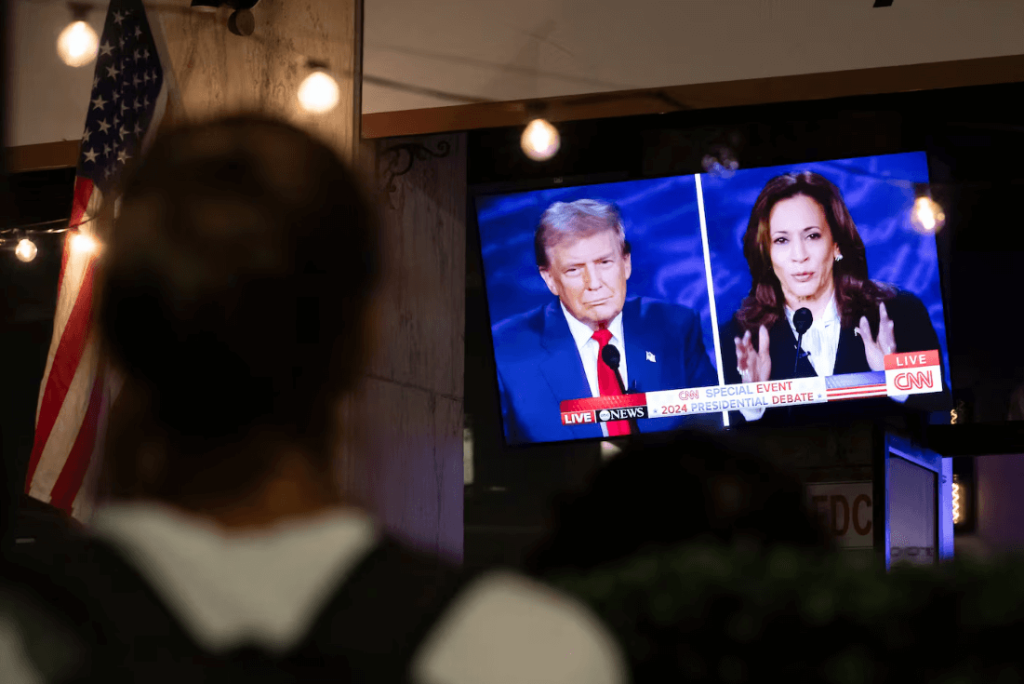【中美创新时报2024 年 10 月 24 日编译讯】(记者温友平编译)诽谤、谎言和肮脏的伎俩——我们今天所说的虚假信息——长期以来一直是美国总统竞选活动的一个特征。然而,据记录虚假信息的官员和研究人员称,在今年投票前两周,来自国内外的半真半假、谎言和捏造的报道已经超过了以往任何时候。《纽约时报》记者史蒂文·李·迈尔斯对此作了下述报道。
民主党副总统候选人被诬告性骚扰学生。这些指控是由佛罗里达州一名前副警长在数十个社交媒体平台和虚假新闻媒体上传播的,他现在公开在莫斯科为俄罗斯的宣传机构工作。
一段伪造的视频声称展示了一名受害者——制造假人是俄罗斯惯用的伎俩——在世界首富埃隆·马斯克拥有的社交平台 X 上获得了超过 500 万次观看。马斯克不仅全力支持共和党候选人、前总统唐纳德·特朗普,还利用他的平台重新宣扬关于选举结果有效性的不可信说法。
诽谤、谎言和肮脏的伎俩——我们今天所说的虚假信息——长期以来一直是美国总统竞选活动的一个特征。然而,据记录虚假信息的官员和研究人员称,在今年投票前两周,来自国内外的半真半假、谎言和捏造的报道已经超过了以往任何时候。
这对 11 月 5 日选举结果的影响还有待观察,但它已经贬低了关于两大党候选人特朗普和副总统卡马拉·哈里斯的政治辩论。它还腐蚀了美国民主的基础,破坏了曾经的共同信心,即无论谁获胜,美国的选举都是自由和公正的。
俄罗斯、伊朗和中国都兴高采烈地煽动了许多这样的叙事,将美国民主描绘成功能失调和不可信的。政客和有影响力的媒体人物反过来为外国对手提供了大量素材,煽动和扩大分裂,以谋取党派优势。
“他们确实有不同的策略和不同的方法来影响行动,但他们的目标是相同的,”华盛顿网络安全和基础设施安全局局长 Jen Easterly 在接受采访时谈到外国对手时说。“很简单,他们试图破坏美国人对我们的民主制度和选举的信任,并挑起党派纷争。”
许多因素导致了虚假信息的激增,Easterly 和其他官员警告说,这种情况将持续到选举日之后。
社交媒体平台帮助将媒体生态系统强化为截然不同的党派飞地,在那里,与先入为主的叙述相矛盾的事实往往不受欢迎。人工智能已成为一种催化剂,只需按几下键,虚假或虚构的内容便可在网上无处不在。
在当今的政治辩论中,事实似乎不如感情重要,而感情在网上很容易被操纵。
特朗普的竞选搭档、参议员 JD Vance 因传播一种种族主义虚构故事而受到批评,该虚构故事称俄亥俄州斯普林菲尔德的海地移民正在吃该市的猫和狗。他辩称,他反映的是当地居民的实际担忧,即使不是实际事实。(特朗普则在周一接受福克斯新闻的霍华德·库尔茨采访时坚持最初的说法。“那只鹅呢,鹅呢,那只鹅呢,那里发生了什么?”他说。“它们都失踪了。”)
同样,特朗普成功地重新提起了 2020 年与拜登总统竞选结果不合法的指控——只是断然拒绝承认其他结果。选举官员以及众多法院一再表示,2020 年没有选举舞弊。
回想起来,与现在的情况相比,四年前挑战选举结果的努力是杂乱无章的,甚至是荒谬的。有一次,那些声称选举舞弊的人错误地选择了费城一家小型家族企业四季景观设计公司作为新闻发布会的举办地,而不是市中心更著名的酒店。即便如此,特朗普的挑战最终导致了 2021 年 1 月 6 日国会山的暴力事件。
或许,当今虚假信息格局中最大的单一因素是马斯克对推特的所有权,他在 2020 年大选两年后收购了推特,并将其更名为 X。
推特前首席执行官杰克·多西和 Facebook 和 Instagram 所有者 Meta 的负责人马克·扎克伯格都面临公众和政府的压力,要求他们执行自己的政策来打击故意虚假或有害的内容,尤其是在新冠疫情和 2020 年大选期间。
8 月,扎克伯格致函俄亥俄州共和党众议员、众议院司法委员会主席吉姆·乔丹,后者是保守派反对主要社交媒体平台审核的领头人。
扎克伯格表示,事后看来,Facebook 错误地限制了对一些有关疫情和拜登儿子亨特的笔记本电脑的内容的访问。
Meta 的立场表明,该公司希望退出美国激烈的政治辩论,尽管该公司表示,它将继续审核虚假的选举内容。相比之下,马斯克利用 X 将自己置身于其中。
他解散了平台上标记虚假或仇恨内容的团队,并欢迎因违反公司规则而被禁止的数十名用户回归。
他为特朗普的竞选筹集了数百万美元,并在宾夕法尼亚州露面为他竞选。在向他的 2 亿粉丝(比特朗普在该平台上的巅峰时期的粉丝还多)发帖时,他还重复了未经证实的说法,即民主党正在招募不符合资格的移民来登记投票。
本文最初发表于《纽约时报》。
题图:9 月 10 日,副总统卡马拉·哈里斯和前总统唐纳德·特朗普在总统辩论中。虚假信息已经贬低了政治辩论。民主新闻联盟/news aktuell via AP Images/美联社
附原英文报道:
As election looms, disinformation has ‘never been worse’
By Steven Lee Myers New York Times,Updated October 23, 2024
Vice President Kamala Harris and former president Donald Trump during the presidential debate on Sept. 10. Disinformation has already debased what passes for political debate.Democracy News Alliance/news aktuell via AP Images/Associated Press
The Democratic Party’s vice presidential nominee has been falsely accused of sexually molesting students. The claims have been spread by a former deputy sheriff from Florida, now openly working in Moscow for Russia’s propaganda apparatus, on dozens of social media platforms and fake news outlets.
A faked video purporting to show one victim — creating fake people is a recurring Russian tactic — received more than 5 million views on X, a social platform owned by the world’s richest man, Elon Musk. Musk has not only leaned all in for the Republican nominee, former president Donald Trump, but he also used his platform to reanimate discredited claims about the validity of the election’s outcome.
Smears, lies, and dirty tricks — what we call disinformation today — have long been a feature of American presidential election campaigns. Two weeks before this year’s vote, however, the torrent of half-truths, lies, and fabrications, both foreign and homegrown, has exceeded anything that came before, according to officials and researchers who document disinformation.
The effect on the outcome on Nov. 5 remains to be seen, but it has already debased what passes for political debate about the two major party candidates, Trump and Vice President Kamala Harris. It has also corroded the foundations of the country’s democracy, undermining what was once a shared confidence that the country’s elections, regardless of who won, have been free and fair.
Russia, as well as Iran and China, have gleefully stoked many of the narratives to portray American democracy as dysfunctional and untrustworthy. Politicians and influential media figures have in turn given foreign adversaries plenty of fodder to work with, inciting and amplifying divisiveness for partisan advantage.
“They do have different tactics and different approaches to influence operations, but their goals are the same,” Jen Easterly, the director of the Cybersecurity and Infrastructure Security Agency in Washington, said in an interview, referring to foreign adversaries. “Very simply, they’re looking to undermine American trust in our democratic institutions and the election specifically, and to sow partisan discord.”
Numerous factors have contributed to the surge in disinformation, which Easterly and other officials have warned will continue far beyond Election Day.
Social media platforms have helped to harden media ecosystems into distinct, disparate partisan enclaves where facts contradicting preconceived narratives are often unwelcome. Artificial intelligence has become an accelerant, making fake or fanciful content ubiquitous online with merely a few keystrokes.
In today’s political debate, it seems, facts matter less than feelings, which are easily manipulated online.
Trump’s running mate, Senator JD Vance, after facing criticism for popularizing a racist fiction that Haitian immigrants in Springfield, Ohio, were eating the city’s cats and dogs, argued he was reflecting local residents’ actual concerns, if not actual facts. (Trump, for his part, stood by the original claims in an interview with Fox News’ Howard Kurtz on Monday. “What about the goose, the geese, what about the geese, what happened there?” he said. “They were all missing.”)
In much the same way, Trump has succeeded in reviving allegations that the outcome of the race against President Biden in 2020 was not legitimate — simply by flatly refusing to concede otherwise. Election officials, as well as numerous courts, have said repeatedly that there was no election fraud in 2020.
In hindsight, the efforts to challenge the results four years ago were haphazard, even farcical, compared with what is happening now. At one point the people pushing claims about election fraud mistakenly chose Four Seasons Total Landscaping, a small family business in Philadelphia, as a venue for a news conference instead of the more famous hotel downtown. Even so, Trump’s challenge culminated in the violence on Capitol Hill on Jan. 6, 2021.
Perhaps the single biggest factor in today’s disinformation landscape has been Musk’s ownership of Twitter, which he bought two years after the 2020 election and rebranded as X.
Twitter’s previous CEO, Jack Dorsey, along with Mark Zuckerberg, the head of Meta, the owner of Facebook and Instagram, faced public and government pressure to enforce their own policies against intentionally false or harmful content, especially around the COVID pandemic and the 2020 election.
In August, Zuckerberg wrote a mea culpa to Representative Jim Jordan, Republican of Ohio, the chair of the House Judiciary Committee, who has led the conservative charge against moderation by the major social media platforms.
Zuckerberg said that, in hindsight, Facebook had wrongly restricted access to some content about the pandemic and the laptop belonging to Biden’s son, Hunter.
Meta’s stance signaled a desire to step back from America’s fractious political debate, though the company says it continues to moderate false election content. Musk has by contrast used X to thrust himself square into the middle of it.
He dismantled the platform’s teams that flagged false or hateful content and welcomed back scores of users who had been banned for violating company rules.
He has raised millions of dollars for Trump’s bid and campaigned for him in appearances in Pennsylvania. In posts to his 200 million followers — more than Trump had in his heyday on the platform — he has also repeated unsubstantiated claims that the Democrats are recruiting ineligible immigrants to register to vote.
This article originally appeared in The New York Times.
